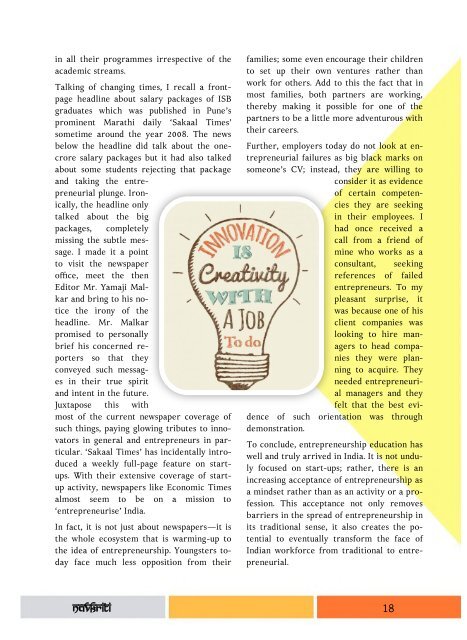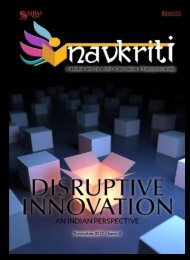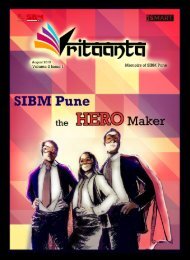Navkriti Issue 1
The inaugural issue of NAVKRITI focuses on how SIBM Pune views Innovation and Entrepreneurship and how the institute is incorporating it into the curriculum.
The inaugural issue of NAVKRITI focuses on how SIBM Pune views Innovation and Entrepreneurship and how the institute is incorporating it into the curriculum.
You also want an ePaper? Increase the reach of your titles
YUMPU automatically turns print PDFs into web optimized ePapers that Google loves.
in all their programmes irrespective of the<br />
academic streams.<br />
Talking of changing times, I recall a frontpage<br />
headline about salary packages of ISB<br />
graduates which was published in Pune’s<br />
prominent Marathi daily ‘Sakaal Times’<br />
sometime around the year 2008. The news<br />
below the headline did talk about the onecrore<br />
salary packages but it had also talked<br />
about some students rejecting that package<br />
and taking the entrepreneurial<br />
plunge. Ironically,<br />
the headline only<br />
talked about the big<br />
packages, completely<br />
missing the subtle message.<br />
I made it a point<br />
to visit the newspaper<br />
office, meet the then<br />
Editor Mr. Yamaji Malkar<br />
and bring to his notice<br />
the irony of the<br />
headline. Mr. Malkar<br />
promised to personally<br />
brief his concerned reporters<br />
so that they<br />
conveyed such messages<br />
in their true spirit<br />
and intent in the future.<br />
Juxtapose this with<br />
most of the current newspaper coverage of<br />
such things, paying glowing tributes to innovators<br />
in general and entrepreneurs in particular.<br />
‘Sakaal Times’ has incidentally introduced<br />
a weekly full-page feature on startups.<br />
With their extensive coverage of startup<br />
activity, newspapers like Economic Times<br />
almost seem to be on a mission to<br />
‘entrepreneurise’ India.<br />
In fact, it is not just about newspapers—it is<br />
the whole ecosystem that is warming-up to<br />
the idea of entrepreneurship. Youngsters today<br />
face much less opposition from their<br />
families; some even encourage their children<br />
to set up their own ventures rather than<br />
work for others. Add to this the fact that in<br />
most families, both partners are working,<br />
thereby making it possible for one of the<br />
partners to be a little more adventurous with<br />
their careers.<br />
Further, employers today do not look at entrepreneurial<br />
failures as big black marks on<br />
someone’s CV; instead, they are willing to<br />
consider it as evidence<br />
of certain competencies<br />
they are seeking<br />
in their employees. I<br />
had once received a<br />
call from a friend of<br />
mine who works as a<br />
consultant, seeking<br />
references of failed<br />
entrepreneurs. To my<br />
pleasant surprise, it<br />
was because one of his<br />
client companies was<br />
looking to hire managers<br />
to head companies<br />
they were planning<br />
to acquire. They<br />
needed entrepreneurial<br />
managers and they<br />
felt that the best evidence<br />
of such orientation was through<br />
demonstration.<br />
To conclude, entrepreneurship education has<br />
well and truly arrived in India. It is not unduly<br />
focused on start-ups; rather, there is an<br />
increasing acceptance of entrepreneurship as<br />
a mindset rather than as an activity or a profession.<br />
This acceptance not only removes<br />
barriers in the spread of entrepreneurship in<br />
its traditional sense, it also creates the potential<br />
to eventually transform the face of<br />
Indian workforce from traditional to entrepreneurial.<br />
<strong>Navkriti</strong><br />
18














